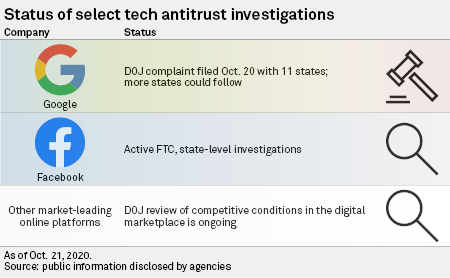Featured Topics
Featured Products
Events
S&P Global Offerings
Featured Topics
Featured Products
Events
S&P Global Offerings
Featured Topics
Featured Products
Events
S&P Global Offerings
Featured Topics
Featured Products
Events
Language
Featured Products
Ratings & Benchmarks
By Topic
Market Insights
About S&P Global
Corporate Responsibility
Culture & Engagement
Featured Products
Ratings & Benchmarks
By Topic
Market Insights
About S&P Global
Corporate Responsibility
Culture & Engagement

The expansion of Apple, Alphabet, Amazon.com, and Facebook across the smartphone ecosystem, digital advertising, e-commerce, and social media could decelerate as the tech giants face scrutiny from U.S. and European regulators. In China, Alibaba may be the most likely target of growing antitrust scrutiny of internet companies in the country.
Published: December 8, 2020
The seemingly unstoppable expansion of Apple Inc., Alphabet Inc., Amazon.com Inc., and Facebook Inc. in the smartphone ecosystem, digital advertising, e-commerce, and social media could decelerate as the tech giants face scrutiny from the U.S. Congress, Department of Justice (DoJ), and Federal Trade Commission (FTC)--and that's naming only the domestic regulators.
The DoJ and FTC have favored self-regulation to avoid hindering innovation. And they haven't established a framework to regulate and provide ongoing monitoring of the rapidly changing technology industry. However, as the complaints from competitors and consumers have become more frequent, and as regulators themselves--as consumers--recognize the scale and power of these companies, they have mobilized. Regulators now have the difficult task of determining whether the rising concentration of market power in a handful of large tech participants acts in ways that are harmful to consumers and competitors, or, as large tech companies have asserted, promotes rapid innovation and job creation.
Google Hit with Multistate Antitrust Suit Involving Facebook
Texas and nine other states filed an antitrust lawsuit Dec. 16 against Alphabet Inc.'s Google LLC alleging anti-competitive conduct, exclusionary practices and deceptive misrepresentations.
Read the Full ArticleFacebook to 'Tread Very Carefully' in M&A Space Amid Antitrust Woes
The FTC and 48 attorneys general from across the U.S. recently filed two separate antitrust lawsuits against Facebook.
Read the Full ArticleAntitrust Case Against Facebook Holds 'Little Bite,' Analysts Say
Analysts largely expect Facebook Inc. to prevail in its antitrust battle with the U.S. Federal Trade Commission and a group of attorneys general, noting that fines will be the most likely outcome of the lawsuits rather than significant business model changes.
Read the Full Article
The U.S. Justice Department filed an antitrust lawsuit against Google on Oct. 20 alleging that the company unlawfully maintained monopolies in the general search, search advertising and general search text advertising markets through "anticompetitive and exclusionary practices. 
What a Biden Administration Might Mean for DOJ's Antitrust Case Against Google
The Trump administration launched its antitrust legal challenge against Alphabet Inc.'s Google LLC this week.
Read the Full ArticleNext U.S. President Under Pressure to Act on Antitrust and Rampant M&A
President-elect Joe Biden will be under growing pressure to reverse decades of light touch antitrust regulation after both Democrats and Republicans used a House antitrust subcommittee report on Big Tech to call for the regulator to be beefed up.
Read the Full Article
European regulators' decision to bring antitrust charges against Amazon.com Inc. could be a harbinger of developments in the U.S., with regulatory uncertainty likely to extend well into 2021, legal and industry experts say.
In charges announced Nov. 10, the European Commission accused Amazon of violating EU antitrust rules by using data from third-party sellers on its platform to compete against them with its own retail business. The majority of sales on Amazon's site are sold by third-party merchants.
Amazon faces similar allegations in the U.S., where lawmakers have alleged that the company is undercutting small businesses by using data from third-party sellers to inform its own products.
UK's Facebook, Giphy Deal Scrutiny is Sign of M&A Challenges to Come — Analysts
Scrutiny of Facebook Inc.'s acquisition of animated-picture database Giphy Inc. in the U.K. suggests the country is taking a harder line on the social media company's deal-making.
Read the Full ArticleUK Could Force Facebook to Divest Assets Over Giphy deal
The U.K.'s Competition and Markets Authority could urge Facebook Inc. to divest some of its assets and services if it finds the proposed acquisition of Giphy Inc. to be anti-competitive, Bloomberg News reported Oct. 19.
Read the Full Article
China's antitrust probe into Alibaba Group Holding Ltd., the country's largest and most high-profile internet company, is more about sending a message to the tech industry than targeting the group and its founder Jack Ma, industry observers said.
Beijing's series of actions relating to Alibaba, which include an investigation into alleged forced exclusive deals with merchants and the blocking of its affiliate Ant Group Co. Ltd.'s IPO, is intended to show the country's thriving internet sector that no one is above state rules and that any violation will be dealt with swiftly and severely. Influential internet companies such as Tencent Holdings Ltd., Meituan and Pinduoduo Inc. may find themselves subject to similar levels of scrutiny in 2021, they said.
Alibaba in Crosshairs of Growing Antitrust Scrutiny in China
Alibaba Group Holding Ltd.'s dominant position in the online retail and digital payments markets make it the most likely target of growing antitrust scrutiny of Chinese internet companies, industry experts say.
The State Administration for Market Regulation on Nov. 10 released draft regulations aimed at curbing anti-competitive behavior, citing practices such as exclusive contracts with merchants and predatory pricing that are allegedly common in the Chinese e-commerce space. The proposal is open to public consultation until Nov. 30.

